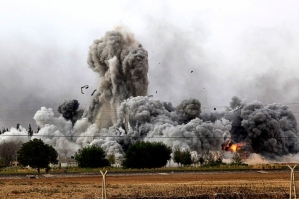
The United States has done its best to limit civilian casualties in the coalition air bombing campaign against ISIS. However, some Iraqis and American officers contended that such an approach has benefited the terror group on the battlefield.
According to Eric Schmitt of the New York Times, American officials stated that despite being equipped with the most precise aerial arsenal in history, obvious ISIS targets are not being bombed due to fear that civilians may die in the process. This has left convoys of heavily armed ISIS militants, along with the organization's headquarters in the Syrian city of Raqqa, largely untouched by bombs.
"The international alliance is not providing enough support compared with ISIS' capabilities on the ground in Anbar," Iraqi Maj. Muhammed al-Dulaimi said. "The U.S. airstrikes in Anbar didn't enable our security forces to resist and confront the ISIS attacks."
Dulaimi contended that his forces "lost large territories in Anbar [province] because of the inefficiency of the U.S.-led coalition airstrikes."
Schmitt reported that many Iraqi commanders and some American officers argued that ISIS has been able to control a wide area between Iraq and Syria because of the discretion exercised in conducting airstrikes.
"That caution - coupled with President Obama's reluctance to commit significant American firepower to a war the White House declared over in 2011, when the last United States combat troops withdrew from Iraq - has led to persistent complaints from Iraqi officials that the United States has been too cautious in its air campaign," Schmitt wrote.
Schmitt reported that the cautionary measures pursued by the U.S. in the region were due to experience in past conflicts.
"Civilian deaths from American airstrikes during the wars in Iraq and Afghanistan were sometimes unacknowledged or understated by the military and caused a great deal of anger, which is a reason for the United States' current skittishness and what commanders say is their overriding goal to prevent those deaths now," Schmitt wrote.
The British-based Syrian Observatory for Human Rights claimed to Schmitt that more than 120 civilians have been killed by airstrikes inside Syria. However, other human rights advocates stated that the number of civilian lives saved by airstrike restrictions remains unclear.
"The U.S. has indeed put in place rigorous policies and procedures to minimize civilian harm, but with no combat troops on the ground, it is hard to evaluate how successful these policies have been," Federico Borello, executive director of the advocacy group Center for Civilians in Conflict, said.
According to Schmitt, ISIS militants have exploited the restrictions, increasingly hiding behind the civilian population as they conducted their attacks.
"In Iraq, more than 80 percent of the allied airstrikes are supporting Iraqi troops in hotly contested areas like Ramadi and Baiji, the home of a major oil refinery," Schmitt wrote. "Many of the other strikes focus on so-called pop-up targets - small convoys of militants or heavy weaponry on the move."
Schmitt then turned to U.S. efforts in Syria, where it had a "limited ability to gather intelligence." However, the U.S. managed to pull off a major development by sending in Special Forces to take out the financial leader of ISIS.
"Many Islamic State training compounds, headquarters, storage facilities and other fixed sites were struck in the early days of the bombing, but the military's deliberate process for approving other targets has frustrated several commanders," Schmitt wrote.
An unnamed U.S. pilot of an A-10 attack plane sent an email to the New York Times about the progress that resulted from the airstrike restrictions.
"We have not taken the fight to these guys," the pilot said. "We haven't targeted their centers of gravity in Raqqa. All the roads between Syria and Iraq are still intact with trucks flowing freely."
The pilot added that there was a cumbersome process in approving the targets, which included the use of unmanned aerial vehicles, commonly known as drones.
"In most cases, unless a general officer can look at a video picture from a U.A.V., over a satellite link, I cannot get authority to engage," the pilot said on condition of anonymity.
Schmitt elaborated on the progress of the coalition's bombing campaign against ISIS based on U.S. military figures.
"The air campaign has achieved several successes in conducting about 4,200 strikes that have dropped about 14,000 bombs and other weapons, Schmitt wrote. "The campaign has killed an estimated 12,500 fighters and helped Iraqi forces regain about 25 percent of the territory seized in Iraq by the Islamic State, according to American military figures."
However, U.S. officials acknowledged to Schmitt that ISIS has adapted to their bombing tactics. The terror group even used the cover of a sandstorm when they took over the Iraqi city of Ramadi.
"We have always said this fight will be difficult, and there will be some setbacks," Lt. Gen. John Hesterman III said in a statement from his Qatar headquarters. "Coalition air power has dramatically degraded Daesh's ability to organize, project and sustain combat power while taking exceptional care to limit collateral damage and civilian casualties."
However, an anonymous aid worker from Raqqa told the New York Times that no ground force currently exists to challenge the firm grip of ISIS on the city.
"If they had acted when ISIS was small, they could have stopped them, but now it has settled and grown, and people have gotten used to it," the aid worker said. "As long as there is no plan to get rid of them, they are staying, and it is clear that there is no plan."







